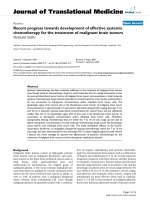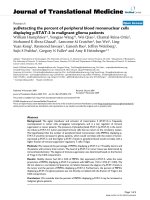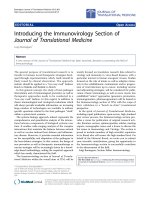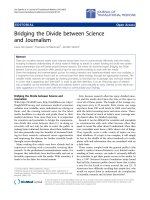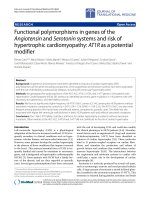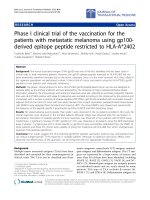Báo cáo hóa học: " Introducing the Immunovirology Section of Journal of Translational Medicine" docx
Bạn đang xem bản rút gọn của tài liệu. Xem và tải ngay bản đầy đủ của tài liệu tại đây (115.61 KB, 1 trang )
EDI T O R I A L Open Access
Introducing the Immunovirology Section of
Journal of Translational Medicine
Luigi Buonaguro
*
Abstract
A new section of the Journal of Translational Medicine has been launched, devoted to promoting the field of
Immunovirology.
The general purpose of translational research is to
transfer in humans novel therapeutic strategies devel-
oped through experimentation which, itself, should b e
finely tuned by clinical observation. The approach,
indeed, should be applied in a “two-way road” fashion:
Bench to Bedside and Bedside to Bench.
In this general concept, the study of host-pathogen
interrelation and of immunol ogical preventive as well as
therapeutic approaches needs to be conducted in a
“two-way road” fashion. In this regard, in addition to
classic immunological and virological evaluations which
will always provide invaluable information, an increasing
large number of technologies are available to address
specific questions related to the host-pathogen “clash”
within a system-level scenario.
The systems biology approach, indeed, represents the
comprehensive and quantitative analysis of the interac-
tions between components of biological systems over
time. It enables wide-ranging a nalysis of the complex
interactions that maintain the balance between natural
as well as vaccine-induced host defence and inflamma-
tory disease. Moreover, it provides essential information
on the susceptibility and adaptation of the pathogens to
the host-defence strategies. In this context, the design of
new preventive as well as therapeutic immunotherapy or
vaccine strategies will be increasingly driven by a knowl-
edge-based methodology, ending the empirical approach
which has mostly characterized the field.
The Immunovirology section of Journal of Transla-
tional Medicine within the overall aims of JTM, will be
mainly focused on translation research data related to
virology and immunity to virus-based diseases, with a
particular interest in human oncogenic viruses. Studies
focused on the role of i nnate as well as adaptive immu-
nity in the establishment, containment a nd/or progres-
sion of viral infections up to cancer, including vaccine
and adjuvanting strategies, will be considered for publi-
cation. Classic immunology as well as more recent, less
established “omics” approaches (genomics, proteomics,
immuno genomics, pharmacogenomics) will be hosted in
the Immunovirology section of JTM, with the scope of
their validation in a “ bench-to-clinic” translational
perspective.
In the sp irit of Journal of Translational Medicine,
including rapid publication, open-access, high standard
peer review process, the Immunovirology section pro-
vides a venue for publication of original research arti-
cles, literature reviews, opinion/position articles, meeting
reports, monographic issues and a forum to discuss the
hot issues in Immunology and Virology. The section is
proud to include members of high scientific reputation
in its Boar d who will ensure the high standard level. On
behalf of the Editorial Board, we invite you to submit
your scientific contributions, giving the opportunity to
the Immunovirology section to successfully contribute
to the advancement of the field.
Luigi Buonaguro, Section Editor Immunovirology
doi:10.1186/1479-5876-8-3
Cite this article as: Buonaguro: Introducing the Immunovirology Section
of Journal of Translational Medicine. Journal of Translational Medicine 2010
8:3.
* Correspondence:
Lab of Molecular Biology and Viral Oncogenesis & AIDS Reference Center,
Istituto Nazionale Tumori “Fond G Pascale”, Naples, Italy and Institute of
Human Virology, University of Maryland School of Medicine, Baltimore, MD,
USA
Buonaguro Journal of Translational Medicine 2010, 8:3
/>© 2010 Buonaguro; licensee BioMed Central Ltd. This is an Open Access article distributed under the terms of the Creative Commons
Attribution Lic ense ( which permits unrestricted use, distribution, and reproduction in
any me dium, provided the original work is properly cited.


